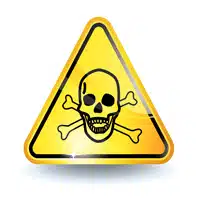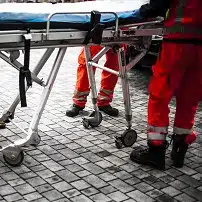When someone thinks about a car accident injury, they might visualize a broken bone or head injury. However, there are many car accident injuries that are not visible. Internal injuries can have grave consequences and should be taken very seriously. One such injury is nerve damage.
Every sensation and voluntary and involuntary movement the body makes involves the nerves. For instance, without nerves, your body would not be able to tell if something is hot or cold, a vital sensation that protects you from harm.
Nerve damage can be painful and is sometimes felt immediately, but the pain is often masked initially and not felt until days later. Following a car accident, it is crucial to seek medical attention, even if your injury seems minor, to be evaluated for nerve damage, as well as other internal injuries.
What Is the Peripheral Nervous System?
Car accidents commonly affect the peripheral nervous system (PNS) that surrounds the brain and spinal cord, two of the most vulnerable parts of the body. The PNS consists of three types of nerves that play a significant role in the body’s ability to function properly:
- Sensory nerves: These nerves are responsible for transmitting the five senses, hearing, smell, sight, taste, and touch, from the spinal cord to the brain. When sensory nerves are damaged, the messages transmitted by these nerves become partially or completely compromised, ranging from sending incorrect signals to a complete loss of sense.
- Motor nerves: Motor nerves transmit information from the brain to the muscles, instructing them to produce movement. Motor and sensory nerves work in tandem with one another. For instance, sensory nerves detect if something is hot, and motor nerves direct the hand to move away from the heat.
- Autonomic nerves: A critical nerve group, autonomic nerves control breathing, heart rate, blood pressure, bladder control, digestion, and more. Autonomic nerves monitor and respond to bodily needs and external stress. Damage to this nerve group in a car accident can result in a life-altering disability.
What Injuries Cause Nerve Damage?
Internal injuries and the body’s reaction to trauma and stress can cause serious nerve damage, often due to compression or inflammation that press against the nerves. Some common injuries that cause nerve damage include:
- Whiplash: The most common injury is whiplash. Although the body is well-restrained by a seat belt and protected by air bags in a collision, the head and neck are not, making them more susceptible to the force of the accident. Whiplash causes the muscles in the neck to stretch and strain beyond typical range of motion, and spinal damage in the neck or inflammation from the torn muscles puts pressure on the nerves. When this happens, nerves become compressed and pinched, damaging their ability to function properly.
- Herniated discs: Sometimes referred to as a slipped disc, herniation is the result of the discs between the spine’s vertebrae being forced out of place. These discs absorb the shock from movements. When herniated, the discs press against the nerves causing damage, sometimes resulting in pain, numbness, and weakness in the limbs.
- Pinched nerves: Pinched nerves are common car accident injuries. As muscles and tissues respond to the trauma and swell from inflammation, they press against the nerves and essentially pinch them, which can lead to nerve damage. Broken bones, tendons, and cartilage can also create pinched nerves following an accident.
What Are the Symptoms of Nerve Damage?
Symptoms of nerve damage tend to be worse at the site of injury. Signs of nerve damage include:
- Shooting or radiating pain in the legs, arms, hands, or feet.
- Numbness, prickling, tinging, or burning sensation in extremities, such as the hands and feet.
- Full or partial paralysis to legs, arms, fingers, or toes.
- Muscle weakness, particularly in the arms and legs.
- Buzzing sensations akin to mild electric shock.
- Uncontrolled muscle movements or twitching.
- Inability to hold objects without dropping them.
- Heightened skin sensitivity to hot or cold temperatures.
Nerve damage is most common in or near the spine but can be in any part of the body. If you are experiencing any symptoms, seek medical attention as soon as possible.
Is Nerve Damage Treatable?
Not all nerve damage is permanent. Depending on the extent of your injury, medical treatment for nerve damage is possible. Diagnosis begins with a physical exam to test your sensations, reflexes, coordination, and strength to help determine whether your sensory or motor nerves are damaged.
Additional neurological tests follow the physical exam to test the electrical activity and nerve function in your muscles and their ability to respond. These tests usually involve imaging scans. Additionally, to determine how quickly electrical impulses move through the muscles, the physician may utilize a nerve conduction velocity (NCV) test, which stimulates muscles through an electrode patch attached to the skin.
Treatment will depend on the severity of the nerve damage. In less severe cases, treatment may include medication for chronic pain, physical therapy, assistive devices, and more. Critically damaged nerve injuries may be treated through surgery, provided the nerve has not died.
Wilmington Car Accident Lawyers at Rhoades & Morrow Can Help You if You Have a Debilitating Injury From a Collision
Suffering nerve damage from a car accident can lead to financial hardship. Our experienced Wilmington car accident lawyers at Rhoades & Morrow can help you if your injury was caused by a negligent driver. Call us at (302) 427-9500 or contact us online to schedule a free consultation. Located in Wilmington, Bear, and Milford, Delaware, we serve clients throughout Middletown, Dover, Milford, Lewes, Rehoboth, Elsmere, and Seaford.





